|
|
|
|
|
Alleged Dr. Belle Wheelan, President,
SACS Commission on Colleges letter addressed
to UNCG David H. Perrin
and NCA&T Alton dated December
16, 2009:
|
Please pardon my delay in responding to
your letter of August 5, 2009, in
which you provided additional
information about the Joint school of
Nanoscience and Nanoengineering (JSNN)
being develop by A&T and UNCG. Instructional
delivery will be through classes and
research activities at A&T, UNCG, and
JSNN facilities. The
nanoengineering curriculum will be
governed by North Carolina A&T
University; nanoengineering degrees will
be awarded by North Carolina A&T
University. The nanoscience curriculum
will be governed by UNCG; nanoscience
degrees will be awarded by UNCG.
Thank you for including a copy of the amended
and restated Management agreement between
the two institutions, providing for the
governance and management of JSNN. The
demonstration of your compliance with
the Joint Curricular Ventures Policy is
acceptable. Emphasis added
|
|
|
|
| Alleged Dr.
Alton Thomas and David H. Perrin signed
transmittal to Dr. Belle Wheelan, President,
COC dated May 24, 2010, your letter
dated December 16, 2009, you stated that
UNCG and NCA&T had demonstrated compliance
with the Commission’s Joint Curricular
Ventures. This Substantive Change
Prospectus provides additional information
about the Joint School of Nanoscience and
Nanoengineering (JSNN) of North Carolina A&T
State University (NC A&T) and the University
of North Carolina at Greensboro (UNCG), as
requested during the April 20, 2010 (10:00
a.m.) conference call with the SACS staff
(Drs. Sarah Armstrong, Tom Benberg and Marcy
Stoll) and the JSNN, NC A&T and UNCG
contacts. These institutions are
respectfully seeking : |
| |
- approval
for UNCG to initiate the PhD and MS in
Nanoscience on the South Campus of
Gateway University Park in fall 2010;
- a
determination of whether the MS and PhD
in Nanoengineering will represent a
substantive change for NC A&T, and
-
recognition of the South Campus of
Gateway University Park as a
non-contiguous part of both campuses
rather than as an off-campus site.
|
|
The address where we hope to
offer the MS and Ph.D. in Nanoscience is:
|
South
Campus, Gateway University Research Park
2901 E. Lee Street
Greensboro, NC 27401-4904
|
|
The information included in
the enclosed full prospectus supplements
the updated management agreement sent to
you on August 5, 2009. The University of
North Carolina Board of Governors approved
the establishment of the MS in Nanoscience
on November 13, 2009, and the establishment
of the Ph.D. program in Nanoscience on
January 8, 2010. ..we have informed UNC
General Administration that we are moving
forward with our plans to offer these
programs in fall semester 2010 (classes
commence on August 16). Approval to do
so from SACS Commission on Colleges is the
last necessary step in this process. |
|
| |
|
Alleged, Dr. Belle Wheelan SACS Commission on Colleges,
letter dated June 25, 2010 to Dr. Alton Thompson
(NCA&T) and Dr. David H. Perrin (UNCG), thank them for
letter dated May 24, 2010 and prospectus for the M.S.
and Ph.D. degrees in nanoscience, a part of the
curriculum sponsored by the joint venture of the two
institutions housed in the Joint School of Nanoscience
and Nanoengineering (JSNN) at two off-campus
instructional sites:
|
South Campus, Gateway University Research
Park 2901 East Lee Street Greensboro, NC
27401-4904 |
|
North Campus, Gateway University Research
Park 5900 Summit Brown Summit, NC 27214 |
Nanotechnology is the investigation
fabrication and characterization of matter structure at
dimensions below 100 mm. and is, by its very nature
interdisciplinary.
A management agreement stipulated
organizational principles, approaches, and protocols has
been formulated and executed by the chancellors of the
two partner institutions. JSNN has two departments:
The Department of Nanoscience at UNCG and the Department
of Nanoengineering at NCA&T. Nanoscience faculty and
staff will be UNCG employee and Nanoscience students
will be UNCG students. Nanoengineering faculty and staff
will be NCA&T employees. UNCG will award nanoscience
degrees; NCA&T will award the Nanoengineering degrees.
The nanoscience programs will begin August 16, 2010. The
M.S. and Ph.D. degree programs in nanoengineering will
begin fall 2012.
Instructional
delivery will be traditional classroom delivery. The
curriculum and student learning outcomes for the M.S.
and Ph.D. degree in nanoscience appear appropriate with
33 hours required for the master's degree and a minimum
of 60 hours, a qualifying exam, and a dissertation
required for the Ph.D. degree.
"We
approve the M.S. and Ph.D. degree programs in
Nanoscience, shall include them within the scope of
accreditation previously granted to the University of
North Carolina at Greensboro”
“We
also approve the two sites listed above as off-campus
instructional sites for the two institutions for
offering 50% or more of a program’s credits.”
Since NC A&T offers approved master's
degrees in Civil Engineering, Chemistry, Biology,
Industrial Systems & System Engineering, Electrical
Engineering, Mechanical Engineering, Computer Science,
Chemical Engineering, Physics, Computation Science and
Engineering, as well as doctoral degrees in Energy and
Environmental Systems Engineering, Computational Science
and Engineering, Electrical Engineering, Mechanical
Engineering, and Industrial and Systems Engineering, the
proposed programs do not appear to be significant
departures from the approved curriculum of NC A&T. We
accept the notification for the programs and require no
additional information from you. Emphasis added |
|
SACSCOC Board of Trustees Publication- June 24, 2010
invalidate Wheelan alleged letter approval of UNCG M.S.
and Ph.D. degree programs in Nanoscience; North and
South Campus as instruction sites for the two
institutions for offering 50% or more of a program’s
credits. |
| |
SUBSTANTIVE CHANGE FOR ACCREDITED
INSTITUTIONS
OF THE COMMISSION ON COLLEGES |
Definition: Substantive change is a
significant modification or expansion of the
nature and scope of an accredited
institution. Under federal regulations,
substantive change includes:
|
- The
addition of courses or programs that
represent a significant departure,
either in content or method of delivery,
from those that were offered when the
institution was last evaluated
-
The establishment of an additional
location geographically apart from the
main campus at which
the institution offers at least 50
percent of an educational program.
Entering into a collaborative academic
arrangement such as a dual degree
program or a joint
degree program with another institution
|
|
| |
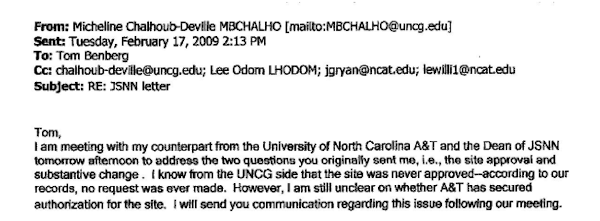 |
Micheline Chalhoub-Deville email
dated February 17, 2009 to SACS Tom Benberg
indicate on the UNC Greensboro side NC A&T
farm property had not been approved for UNCG
to offer academic programs.
|
|
|
April 8, 2010
Lea R. Williams wrote:
Lee,
Marcy Stoll, our SACS
representative, was on-campus this week for the
A&T SACS on-site reaffirmation visit (all went
extremely well) and discussed the 2008 JSNN
substantive change prospectus (attached), which
was never formally submitted to Belle Whelan’s
office. Apparently, we faxed it from here to
Marcy for review and then forgot to follow up. Marcy
said that her office will fast track and monitor
the prospectus through SACS instead of having it
in the queue in the substantive change office,
which could take weeks to review, so that the
UNCG plans to start the nanoscience program in
fall 2010 can proceed, emphasis added. |
|
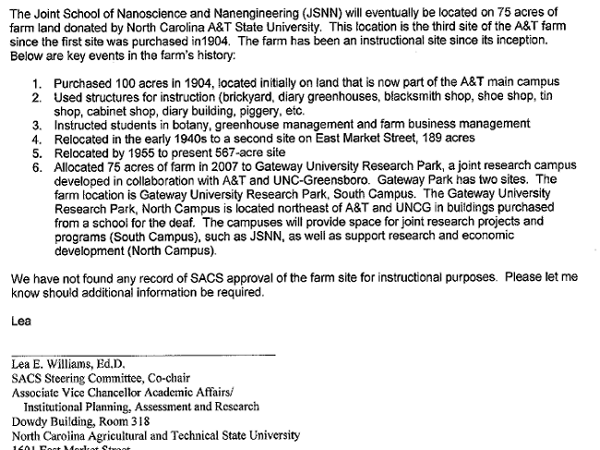 |
|
"We have not found any record of SACS
approval of the farm site for instructional
purposes." said alleged Lea Williams memo. |
|
| |
|
(UNCG) Rebecca Adams to (SACS) Tom Benberg: Sarah
Armstrong Subject: Request for interpretation of
accuracy of nanoscience message, April 13, 2010:
The bottom line, however, is that we need to submit a
full prospectus and need to do so as soon as possible.
This request will be for approval to initiate a new
off-campus site (South Campus) and to initiate a new
degree program (MS in Nanoscience) at that site. Contrary
to previous interpretations, both represent substantive
changes.. Due to the confusion, they are willing to
waive the requirement that we do so 6 months in advance
and will usher it though the approval process in a
timely way so that we can accept students into UNCG's MS
in Nanoscience program next fall. |
| |
|
Alleged Dr. Alton Thomas and David H. Perrin letter to
Dr. Belle Wheelan, President, COC dated May
24, 2010,
your letter dated December 16, 2009, you
stated that UNCG and NCA&T had demonstrated compliance
with the Commission’s Joint Curricular Ventures.
This
Substantive Change Prospectus provides
additional information about the Joint School of
Nanoscience and Nanoengineering (JSNN) of North Carolina
A&T State University (NC A&T) and the University of
North Carolina at Greensboro (UNCG), as requested during
the April 20, 2010 (10:00 a.m.) conference call with the
SACS staff (Drs. Sarah Armstrong, Tom Benberg and Marcy
Stoll) and the JSNN, NC A&T and UNCG contacts. Emphasis
added |
| |
|
Alleged, Dr. Belle Wheelan SACS Commission on Colleges,
letter dated June
25, 2010 to
Dr. Alton Thompson (NCA&T) and Dr. David H. Perrin
(UNCG), thank them for letter dated May 24, 2010 and
prospectus for the M.S. and Ph.D. degrees in
nanoscience, a part of the curriculum sponsored by the
joint venture of the two institutions housed in the
Joint School of Nanoscience and Nanoengineering (JSNN)
at two off-campus instructional sites. "We
approve the M.S. and Ph.D. degree programs in
Nanoscience, shall include them within the scope of
accreditation previously granted to the University of
North Carolina at Greensboro”, “We
also approve the two sites listed above as off-campus
instructional sites for the two institutions for
offering 50% or more of a program’s credits.” |
| |
|
Duties of the Board of Trustees (c) It shall
take final action on the accreditation of
applicant, candidate, and member
institutions and shall report to the College
Delegate Assembly at its Annual Business
Session those institutions approved for
accreditation and those which have not been
approved for accreditation. The final
action of the SACSCOC Board of Trustees
shall be based on its determination of an
institution’s compliance with Commission
standards, policies, and procedures. The
list of collegiate institutions approved for
accreditation shall be published. [STANDING
RULES: SACSCOC BOARD OF TRUSTEES, EXECUTIVE
COUNCIL] |
 Commission
June 24, 2010 only approved
substantive change was Eastfield
College, Mesquite, Tex. off-campus
instructional sites at South Garland
High School and Lakeview Centennial
High School. Commission
June 24, 2010 only approved
substantive change was Eastfield
College, Mesquite, Tex. off-campus
instructional sites at South Garland
High School and Lakeview Centennial
High School.
Note:
SACSCOC Board of Trustees -
December 6, 2010 Substantive
Change: Approved the Associate
of Science in Nursing and the
Licensed Practical Nurse Keiser
University, Ft. Lauderdale, Fla.
to Bauder College, Atlanta, Ga.
|
|
|
| |
Tom Benberg to Rebecca Adams July 08, 2010:
The June
25th letter
addressed to you was the first of two letters written on
that dated and it simply acknowledges your letter of
March 9th and confirms that a prospectus for the South
Campus instruction site is under review. Later that same
day, the June 25th letter to Drs. Thomas and Perrin was
written following conclusion of the prospectus review.
In that letter we have approved: (a) the South and North
Campuses as instruction sites, and (b) the MS and Ph.D.
programs in Nanoscience for UNCG. Additionally, we
indicated that the proposed programs for NCA&T do not
represent significant departures from existing
programming. Unambiguous alleged approval of UNC
Greensboro M.S. and Ph.D. degree programs and two sites
listed above as off-campus instructional sites weren’t
SACS Board of Trustees approval June 25, 2009. |
|
|
JSNN Amended and Restated
Management Agreement ( April 27, 2009) did not
constitute an agreement between NCA&T and UNCG for
purposes of awarding academic credits and/or educational
program completion credentials, e.g., certificates,
diplomas, degrees or transcripts. Where as JSNN April
27, 2009 Shared Academic agreement explicit removed
shared curriculum from
JSNN March 2008 management
Agreement . |
| |
| JSNN April 2009 Amended and Restated Management
Agreement, Article I: Organization Principle NCA&T and
UNCG are committed to the principle that the JSNN is a
shared academic unit of the two institutions in terms of
governance and management -explicitly - removing
curriculum from shared academic unit from March 2008
JSNN Management Agreement. |
| |
|
Voice and email traffic with Sara
Armstrong, Commission Substance Change
Specialist and participant in UNCG MS and PhD
Nanoscience authorizations determination;
established UNC-Greensboro M.S. and PhD.
Nanoscience authorization were pursuant SACSCOC
COLLABORATIVE ACADEMIC ARRANGEMENTS: POLICY AND
PROCEDURES as a dual educational program with
NCA&T. |
| |
| A dual
educational program is one whereby students
study at two or more institutions, and each
institution awards a separate program completion
credential bearing only its own name, seal and
signature. Emphasis added. |
|
| |
|
|
Dr. Sara Armstrong:
“The “program” is a cooperative venture by
which the two institutions share facilities,
equipment and other resources, called the Joint
School of Nanoscience and Nanoengineering
operated by University of North Carolina
Greensboro (UNC-G) and North Carolina
Agricultural and Technical State University (NCATSU).
Four degrees are offered: |
| |
|
- At UNC-G:
Master of Science and Doctor of Philosophy
in Nano Science (began Fall, 2010)
- At NCATSU:
Master of Science and Doctor of Philosophy
in Nanoengineering (to begin Fall, 2012)
|
| |
|
|
SACS COLLABORATIVE
ACADEMIC ARRANGEMENTS POLICY, Collaborative
academic arrangements are agreements between
institutions purposes of awarding academic
credits and/or educational program completion
credentials, e.g., certificates, diplomas,
degrees or transcripts. |
| |
|
Contractual Agreement –
typically is one in which an institution enters
an agreement for receipt of courses/programs or
portions of courses or programs (i.e., clinical
training internships, etc.) delivered by another
institution or service provider. [SUBSTANTIVE
CHANGE FOR SACSCOC ACCREDITED INSTITUTIONS
Policy Statement]. Therefore a Contractor,
institution or service provider enters into
an agreement to provide courses/programs or
portions of courses or program. |
|
| |
|
Alleged Dr. Belle Wheelan, President,
SACS Commission on Colleges letter addressed
to UNCG David H. Perrin
and NCA&T Alton dated December
16, 2009:
|
Please pardon my delay in responding to
your letter of August 5, 2009, in
which you provided additional
information about the Joint school of
Nanoscience and Nanoengineering (JSNN)
being develop by A&T and UNCG. Instructional
delivery will be through classes and
research activities at A&T, UNCG, and
JSNN facilities. The
nanoengineering curriculum will be
governed by North Carolina A&T
University; nanoengineering degrees will
be awarded by North Carolina A&T
University. The nanoscience curriculum
will be governed by UNCG; nanoscience
degrees will be awarded by UNCG.
Thank you for including a copy of the amended
and restated Management agreement between
the two institutions, providing for the
governance and management of JSNN. The
demonstration of your compliance with
the Joint Curricular Ventures Policy is
acceptable. Emphasis added
|
|
| |
| Alleged Dr. Alton Thomas
and David H. Perrin signed transmittal to Dr. Belle
Wheelan, President, COC dated May 24, 2010, your
letter dated December 16, 2009, you stated that UNCG
and NCA&T had demonstrated compliance with the
Commission’s Joint Curricular Ventures. This
Substantive Change Prospectus provides additional
information about the Joint School of Nanoscience and
Nanoengineering (JSNN) of North Carolina A&T State
University (NC A&T) and the University of North Carolina
at Greensboro (UNCG), as requested during the April 20,
2010 (10:00 a.m.) conference call with the SACS staff
(Drs. Sarah Armstrong, Tom Benberg and Marcy Stoll) and
the JSNN, NC A&T and UNCG contacts. The
information included in the enclosed full prospectus
supplements the updated management agreement sent to
you on August 5, 2009. The University of North
Carolina Board of Governors approved the establishment
of the MS in Nanoscience on November 13, 2009, and the
establishment of the Ph.D. program in Nanoscience on
January 8, 2010. ..we have informed UNC General
Administration that we are moving forward with our plans
to offer these programs in fall semester 2010 (classes
commence on August 16). Approval to do so from SACS
Commission on Colleges is the last necessary step in
this process. |
| |
|
Alleged, Dr. Belle Wheelan SACS Commission on Colleges,
letter dated June 25, 2010 to Dr. Alton Thompson
(NCA&T) and Dr. David H. Perrin (UNCG): A
management agreement stipulated organizational
principles, approaches, and protocols has been
formulated and executed by the chancellors of the two
partner institutions. JSNN has two departments: The
Department of Nanoscience at UNCG and the Department of
Nanoengineering at NCA&T. Nanoscience faculty and staff
will be UNCG employee and Nanoscience students will be
UNCG students. Nanoengineering faculty and staff will be
NCA&T employees. UNCG will award nanoscience degrees;
NCA&T will award the Nanoengineering degrees. The
nanoscience programs will begin August 16, 2010. The
M.S. and Ph.D. degree programs in nanoengineering will
begin fall 2012. |
| |
 Harold
Martin, Rob Nelson, Alan Mabe,
email dated December 09, 2008, Subject Joint
Millennial Campus to: Provosts Perrin and
Thompson UNCG and NCA&TSU , attachment Second
Document Page 9 UNC GA/Questions from UNC
General Administration’s notes
the March 3, 2008 Memorandum (Management
Agreement) needs to be revised, updated and
reapproved. Harold
Martin, Rob Nelson, Alan Mabe,
email dated December 09, 2008, Subject Joint
Millennial Campus to: Provosts Perrin and
Thompson UNCG and NCA&TSU , attachment Second
Document Page 9 UNC GA/Questions from UNC
General Administration’s notes
the March 3, 2008 Memorandum (Management
Agreement) needs to be revised, updated and
reapproved. |
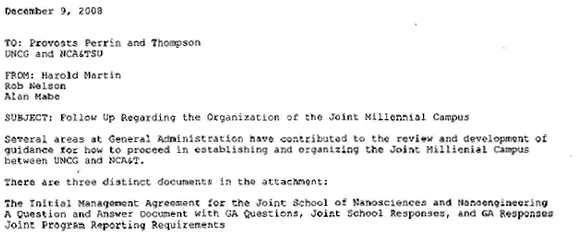 |
 |
|
| |
|
JSNN Amended
and Restated Management Agreement March 2008 |
 |
| |
|
JSNN Amended
and Restated Management Agreement April 27,
2009 |
 |
JSNN Amended and Restated Management
Agreement April 27, 2009 Article I:
Organization Principle NCA&T
and UNCG are committed to the principle that
the JSNN is a shared academic unit of the
two institutions in terms of governance and
management -explicitly - removing
curriculum from shared academic unit from
March 2008 JSNN Management Agreement .
|
For Liberal Arts UNC Greensboro with
doctorial programs in music and nursing to
offer Nanoscience degrees requires access
to NC A&T academic programs and research:
“Although the degree is in Nanoscience (does
not include Nanoengineering),

students will be given the opportunity to
take relevant courses at the School of
Engineering at North Carolina A&T University
and must be able to work on collaborative
projects with faculty in the School of
Engineering. |
| |
| Lacking a collaborative
academic arrangement between between NCA&T
and UNCG for purposes of awarding academic
credits and/or educational program
completion credentials, e.g., certificates,
diplomas, degrees or transcripts, without
which exist no foundation for UNC Greensboro
to be authorized to sell nanoscience
degrees. |
|
|
UNC Greensboro Nanoscience MS
and PHD were not approved by
faculty and Administration |
|
(Principles
of Accreditation, Comprehensive
Standard 3.4.1) any course or
program has been approved by the
faculty and administration; |
|
|
| |
|
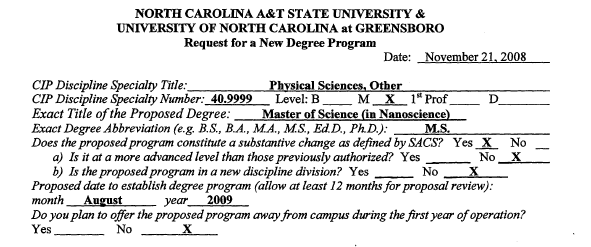 |
NCA&T/UNCG
submitted Joint Request
for authorization to
Establish” Ph.D. in
Nanoscience” dated Oct.
10, 2008 to UNC General
Administration and Joint
Request for
authorization to
establish “Master of
Science (in
Nanoscience)” dated Nov.
21, 2008 to UNC General
Administration.
|
|
|
|
| Notwithstanding May
2007 UNC Board of Governors
established alleged Joint School of
Nanoscience and Nanoengineering, at
bogus NC A&T / UNCG Joint Millennial
Campus, UNCG affiliate, Gateway
University Research Park, Inc. to
offer (a) joint interdisciplinary
Ph.D. degree and (a) joint
professional science master's
degree. |
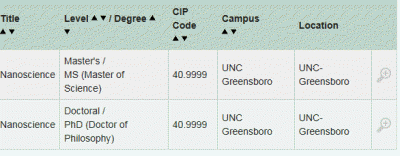 The
University of North Carolina Board
of Governors authorized HWI UNC
Greensboro Nanoscience MS on
November 13, 2009 and PhD program
in Nanoscience on January 8, 2010
requiring UNCG students take
relevant courses at the School of
Engineering at North Carolina A&T
University and be able to work on
collaborative projects with faculty
in the School of Engineering”. The
University of North Carolina Board
of Governors authorized HWI UNC
Greensboro Nanoscience MS on
November 13, 2009 and PhD program
in Nanoscience on January 8, 2010
requiring UNCG students take
relevant courses at the School of
Engineering at North Carolina A&T
University and be able to work on
collaborative projects with faculty
in the School of Engineering”. |
|
Excluding (The) North Carolina
Agricultural and Technical State
university from offering MS and PhD
Nanoscience degrees, forcing the
HBCU out of the JSNN Mission to
offer (a)
joint interdisciplinary Ph.D. degree
and (a) joint professional science
master's degree. And depriving NC
A&T benefit Nanoscience funding. |
|
| |
|
Examining Nanoscience
discipline file at www.northcarolina.edu : |
 |
 |
|
1. The
discipline file contained no UNCG
Notification to plan a master’s in
Nanoscience,
2. The
discipline file contained an unsigned “Revised
UNCG Request to Establish a Master’s
in Nanoscience,
3. The
discipline file contained no UNCG
Request to plan a PhD in Nanoscience
4. The
discipline file contained no UNCG
Request to Established a PhD in
Nanoscience |
|
| |
 |
|
The UNC Policy
Manual 400.1.1.1[G] Adopted 05/06/09 |
|
|
The Chancellor
signature certifies proposal [UNC
Policy Manual 400.1.5(G)] to
establish new degree program was
reviewed and approved by the
appropriate campus committees and
authorities. |
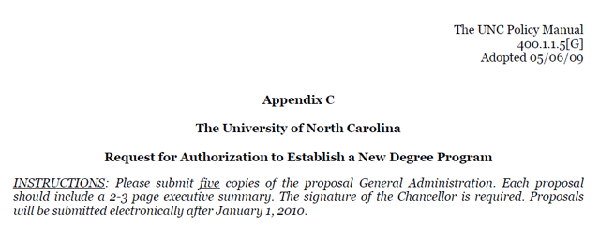 |
 |
Responding to a Public records
request to Dr. David H. Perrin UNCG
Provost & Executive Vice
Chancellor,1/7/11, for a copy of an
UNCG chancellor signed request to
establish stand alone Masters and
PhD Nanoscience degrees at UNCG, Counsel
Steve Serck responded "In
response to your request of 1/7/11,
no such documents as you described
exists." |
| |
|
Unambiguous
lack of UNCG Chancellor
Dr. Linda Brady signed Proposals
requesting to establish Nanoscience
Professional Master of Science in
Nanoscience and Ph.D. Nanoscience
clearly demonstrated UNCG had not expressed
intentions to establish the degrees,
they had not been approved by the
faculty and administration, and were
not pursuant UNC
Policies 400.1.1,1[G]and
400.1.1.5[G], and did not officially
originate from UNC Greensboro. |
|
| |
|
Early in the
investigation of lack of
supporting documentation
for UNCG Nanoscience
degree authorizations
Dr. James Sadler
Associate Vice President
for Academic Planning
University of North
Carolina put forth a
chronology of
authorizations (e-mail
(08/04/2010). |
| |
May 11, 2007
Board of Governors
authorizes establishment
of the Joint School of
Nanoscience and
Nanoengineering. You
ask about any request to
amend the Joint School,
but I am not aware of
any request, emphasis
added. |
| |
|
Dr. Sadler Chronology
acknowledged unsigned alleged
“Revised UNCG Request to
Establish a Master’s in
Nanoscience dated Nov.
9, 2009 was JSNN Dean
Jim Ryan; |
|
| |
|
From: James C.
Sadler < >
Date: Sun, Oct 11, 2009 at 10:07 AM
Subject: Re: Revised version of the
Request to Establish the
Professional Master of Science in
Nanoscience degree program
To: James Ryan <j>
Cc: dhprrin@uncg.edu,
James C Petersen JCPETERS < >, altont@ncat.edu, kmurray@ncat.edu
Thanks, Jim. I'll confer with Alan
about the Ph.D. and whether anything
is needed. Jim Sadler
James Ryan wrote:
Jim,
I have attached a revised version of
the Request to Establish for the
Professional Master of Science in
Nanoscience. I have included the
most recent update of the JSNN
Management Agreement as well as
revised figures on enrollment. I
have also provided additional
explanation to address questions
that were asked during the
disciplinary committee review on
Wednesday. Please review and let me
know if additional information or
clarification is needed.
Also, similar revisions are needed
for the Request to Establish the
Ph.D. in Nanoscience. Should I send
the latest version of that document
to you as well? Thank you.
Jim
James C. Sadler,
Ph.D. Associate Vice President,
Academic Planning
Interim Assoc. VP, Institutional
Research & Analysis UNC General
Administration |
|
November 13, 2009

UNC Board of Governors authorizes
the UNCG MS in Nanoscience based on
the revised request submitted. The
summary that went to the Board can
be viewed in the Planning Committee
pre-meeting materials at this
location: https://www.northcarolina.edu/bog/index.php. |
|
January 8, 2010
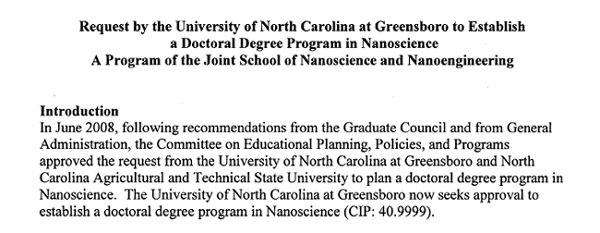
UNC Board of Governors authorizes the UNCG PhD
in Nanoscience based on the revised request
submitted. The summary that went to the Board
can be viewed in the Planning Committee
pre-meeting materials at this location: https://www.northcarolina.edu/bog/index.php. |
|
Amended and
Restated Management Agreement |
|
 |
|
| |
| Pursuant Amended and Restated
Management Agreement curriculum approval
Process JSNN Dean Ryan alleged UNC
Greensboro Revised Request to establish
Nanoscience MS should have been
submitted to UNC Greensboro for review
and approval through established
curricular approval process, not
submitted directly to UNC General
Administration therefore unauthorized. |
|
|
|
|
UNC Greensboro could not
provide one-third or more or the credit through UNCG direct
instruction for Nanoscience PhD to comply with SACS Policy
on Institutional Names on an Academic Credential |
|
"We
approve the M.S. and Ph.D. degree programs in Nanoscience,
shall include them within the scope of accreditation
previously granted to the University of North Carolina at
Greensboro” “We
also approve the two sites listed above as off-campus
instructional sites for the two institutions for offering
50% or more of a program’s credits.” |
| |
|
Erskine Bowles UNC General Administration categorizing
Nanoscience Ph.D. as a Physical Science; examining UNC
Greensboro curricula for similar Physical Science Ph.D.
programs determined: UNC Greensboro offer no similar Ph.D.
programs |
| |
Policy: Institutional Names on an Academic Credential. For
graduate academic credentials, students taking courses from
participating institutions in a collaborative arrangement may
be awarded the academic credential from the
SACSCOC-accredited institution where one-third or more of
the credits were earned through that institution’s own
direct instruction. If
the student earns less than a majority and more than
one-third of the credits through instruction offered by
SACSCOC-accredited institution, the Member institution must
submit documentation in accord with the policy
“Comprehensive Standard 3.6.3: Documenting an Alternative
Approach.” The institution’s documentation for an
Alternative Approach will be forwarded to the SACSCOC Board
of Trustees for approval. [COLLABORATIVE ACADEMIC
ARRANGEMENTS: POLICY AND PROCEDURES Approved: SACSCOC Board
of Trustees, June 2010]
|
Doctor of Philosophy in Nanoscience
The PhD in Nanoscience requires a minimum of
60 hours and is designed to prepare students to take
positions in industrial, governmental, or academic research
settings by providing a solid background in Nanoscience
theory and experimental techniques through course work and
dissertation research. The
PhD program will include a core interdisciplinary curriculum
that provides a thorough background in the principles and
tools required for a research career in Nanoscience.
Program will include a core interdisciplinary curriculum
that provides a thorough background in the principles and
tools required for a research career in Nanoscience.
Student's will take additional elective course related to
their research and professional interests. Admission to the
program will required and undergraduate or maser's degree in
an appropriate science or engineering disciplined as well as
acceptable test scores. |
|
The National Center for
Educational Statistics (NCES) responsible for collecting and
presenting statistical data and information for the nation;
classifies Nanoscience and Nanoengineering as Nanotechnology
CIP 15.1601: Engineering technologies and Engineering
related fields. |
 |
|
PCG/UNC-NCCCS/UNC
Interim report 3.doc/RB.SP.PC.CR.ATPCC.1/CC.14/10May0 |
|
 |
|
University of North Carolina at Greensboro
2007-2008 Profile |
|
 |
|
Notwithstanding the National Center
for Educational Statistics (NCES),
categorized Nanoscience as CIP
15.1601 Engineering Technologies and
Engineering-Related Fields. UNC
General Administration applied CIP
40.9999 (Physical Science) to UNCG
academic offering . Note
UNC-G has a School of Arts and
Science. |
 |
|
| Note Fall
2005 UNC Presidency transition from President
Molly Broad to
Erskine Bowles. |
|
|
Erskine Bowles UNC
General Administration categorizing Nanoscience Ph.D. as a
Physical Science; examining UNC Greensboro curricula for
similar Physical Science Ph.D. programs
determined: |
 |
UNC
Greensboro offer no similar Ph.D.
programs.
|
| |
|
Unambiguous UNC
Greensboro could not provide one-third or
more or the credit through UNCG direct
instruction for Nanoscience PhD to comply
with SACS Policy on Institutional Names on
an Academic Credential |
|
|
|
Liberal Arts UNCG
offering Engineering Technologies and
Engineering-related Field may constitute a significant
change in mission and goals. |
| |
| Significant changes
in mission are those that lead to a fundamental shift in
the nature of the institution. Examples include the
initiation of an engineering school at a liberal arts
institution. Significant departure is
program that is not closely related to previously
approved programs at the institution or site or for the
mode of delivery in question. To determine whether a new
program is a significant departure. it is helpful to
consider the following questions: What previously
approved programs does the institution offer that are
closely related to the new program and how are they
related? |
| |
|
"We approve the M.S. and Ph.D. degree programs in
Nanoscience, shall include them within the scope of
accreditation previously granted to the University of
North Carolina at Greensboro” |
| |
| |
| From Rebecca
Adams Sent: Tuesday, April 13, 2010 To Tom Benberg;
Sarah Armstrong : Contrary to previous
interpretations, both represent substantive changes. Due
to the confusion, they are willing to waive the
requirement that we do so 6 months in advance and will
usher it through the approval process in a timely way to
that we can accept students into UNCG's MS in
Nanoscience program next fall. |
| |
|
Alleged, Dr. Belle Wheelan
SACS Commission on Colleges, letter dated June
25, 2010 to Dr. Alton Thompson (NCA&T)
and Dr. David H. Perrin (UNCG): |
| |
|
-
Nanotechnology is the
investigation fabrication and
characterization of matter structure at
dimensions below 100 mm. and is, by its
very nature interdisciplinary
|
|
| |
|
The National Center for
Educational Statistics (NCES), categorized Nanoscience
as CIP 15.1601 Engineering Technologies and
Engineering-Related Fields. UNC
General Administration applied CIP
40.9999 (Physical Science) to UNCG academic offering . Note
UNC-G has a School of Arts and Science. |
| |
|
Nanotechnology. Definition: A program that
prepares individuals to apply mathematical, scientific,
and engineering principles and technical skills to
manipulate matter at the atomic and molecular level (in
the range of 1-100 nanometers) and to design, fabricate,
and integrate nanoscale structures, devices, and systems.
Includes instruction in materials science, thermodynamics,
nanomaterials, Nano electronics, and nano/micro device
fabrication and testing. [https://nces.ed.gov/search/?q=nano+science]: |
| |
 |
| |
 |
|
PCG/UNC-NCCCS/UNC Interim report
3.doc/RB.SP.PC.CR.ATPCC.1/CC.14/10May05 |
|
| |
For Liberal
Arts UNC Greensboro with programs in music and nursing
to offer Nanoscience degrees requires access to NCA&T
academic programs and research: “Although the degree is
in Nanoscience (does not include Nanoengineering),

students will be given the opportunity to take relevant
courses at the School of
Engineering at North Carolina A&T University and must be
able to work on collaborative projects faculty in the
School of Engineering”. [Request
to Plan Joint NCA&T/UNCG Joint Nanoscience Ph.D.] |
 |
List certificate, diploma and degree programs which
are related to the proposed program( s)
UNCG degree programs related to the Professional Master
of Science (M.S.) in Nanoscience and the Ph.D. in
Nanoscience include the M.S. and Ph.D. programs in
sciences including Mathematics, Nutrition and Chemistry
and the newly approved Ph.D. in Biology. Courses from
these degree programs are used as electives for the
Nanoscience degree programs. Also, UNCG’s graduate
degree programs in business are related to the
Professional M.S. in Nanoscience because business
courses are also required as part of the Professional
M.S. in Nanoscience degree program. [Prospectus p19] |
|
| 1 Alleged Dr. Alton
Thomas and David H. Perrin signed transmittal to Dr.
Belle Wheelan, President, COC dated May 24, 2010 |
|